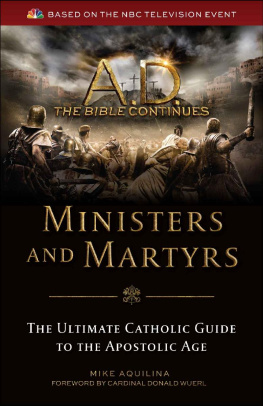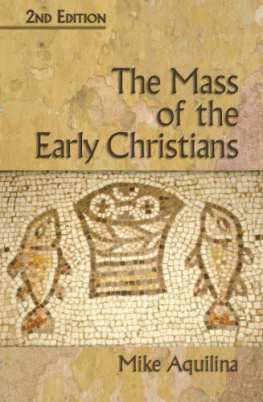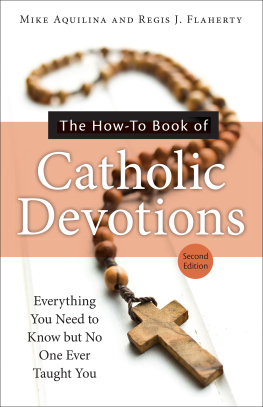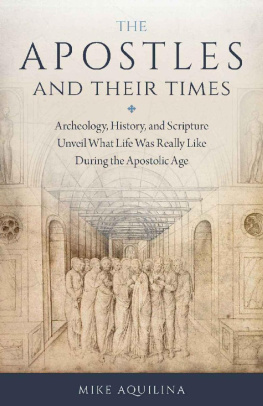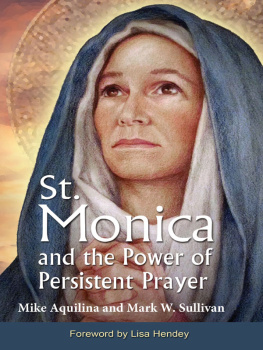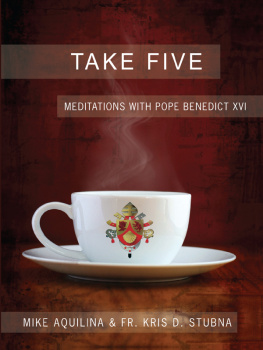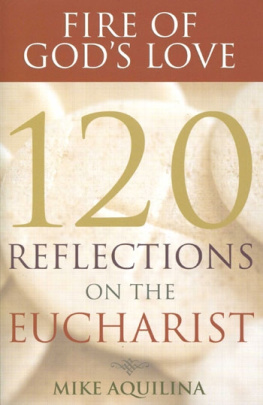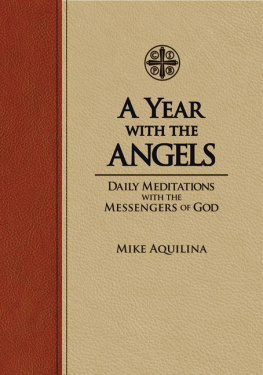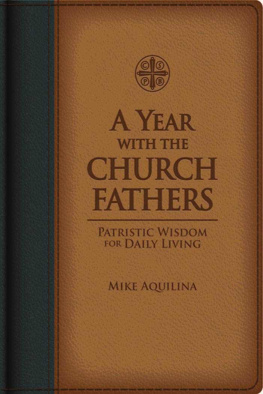Mike Aquilina - A.D. The Bible Continues: Ministers & Martyrs
Here you can read online Mike Aquilina - A.D. The Bible Continues: Ministers & Martyrs full text of the book (entire story) in english for free. Download pdf and epub, get meaning, cover and reviews about this ebook. year: 2015, publisher: Sophia Institute Press, genre: Religion. Description of the work, (preface) as well as reviews are available. Best literature library LitArk.com created for fans of good reading and offers a wide selection of genres:
Romance novel
Science fiction
Adventure
Detective
Science
History
Home and family
Prose
Art
Politics
Computer
Non-fiction
Religion
Business
Children
Humor
Choose a favorite category and find really read worthwhile books. Enjoy immersion in the world of imagination, feel the emotions of the characters or learn something new for yourself, make an fascinating discovery.
- Book:A.D. The Bible Continues: Ministers & Martyrs
- Author:
- Publisher:Sophia Institute Press
- Genre:
- Year:2015
- Rating:5 / 5
- Favourites:Add to favourites
- Your mark:
- 100
- 1
- 2
- 3
- 4
- 5
A.D. The Bible Continues: Ministers & Martyrs: summary, description and annotation
We offer to read an annotation, description, summary or preface (depends on what the author of the book "A.D. The Bible Continues: Ministers & Martyrs" wrote himself). If you haven't found the necessary information about the book — write in the comments, we will try to find it.
A.D. The Bible Continues: Ministers & Martyrs — read online for free the complete book (whole text) full work
Below is the text of the book, divided by pages. System saving the place of the last page read, allows you to conveniently read the book "A.D. The Bible Continues: Ministers & Martyrs" online for free, without having to search again every time where you left off. Put a bookmark, and you can go to the page where you finished reading at any time.
Font size:
Interval:
Bookmark:
Mike Aquilina
Ministers and Martyrs
The Ultimate Catholic Guide
to the Apostolic Age
SOPHIA INSTITUTE PRESS
Manchester, New Hampshire
A.D. The Bible Continues TM & 2015 LightWorkers Media, LLC
ShareADtheSeries.com
Printed in the United States of America
All rights reserved
Biblical references in this book are taken from the Catholic Edition of the Revised Standard Version of the Bible, copyright 1965, 1966 by the Division of Christian Education of the National Council of the Churches of Christ in the United States of America. Used by permission. All rights reserved.
No part of this book may be reproduced, stored in a retrieval system, or transmitted in any form, or by any means, electronic, mechanical, photocopying, or otherwise, without the prior written permission of the publisher, except by a reviewer, who may quote brief passages in a review.
Sophia Institute Press
Box 5284, Manchester, NH 03108
1-800-888-9344
www.SophiaInstitute.com
Sophia Institute Press is a registered trademark of Sophia Institute.
ISBN: 978-1-622822-652
ePub ISBN: 978-1-622822-669
For Ruth and Glenn Shupp, Mom and Dad
Contents
, by Cardinal Donald Wuerl
Foreword
Jesus did not write books. The Gospels show him reading from the scrolls of the prophets (Luke 4:1620) but never setting down his own words. Once we see him writing but he was writing in the dust, words that perhaps no one noticed and were soon blown away or erased by footprints.
Jesus did not write books, but he did use words, and he spoke them to his Church first in the person of his ministers, the Apostles, and then, through his ministers, to the world. What was whispered in private rooms as the Apostles awaited the Spirit has been proclaimed upon the housetops ever since the first Christian Pentecost.
The Apostles handed on the Faith, and that is the simple meaning of the word tradition . It is a handing on, and it takes place within the Church. The life we know as Catholics today with its special rites and customs, its Scriptures and its structures is evident in the records of the apostolic Church. It is there in the small details of the stories we find in the Acts of the Apostles. It is there in the instruction we find in the New Testament letters. The Faith the Apostles practiced and preached in Jerusalem, and took from Jerusalem to the world, is the Faith we practice in our parishes today and take from our parishes to the world.
Ours is the Faith of the apostolic Church. What was then planted as a seed is now grown and flourishing. Over the years the Church has elaborated on that Faith, but never changed it has never added anything to it and never taken anything away.
For two thousand years the Church has reflected on the heritage we have received from the Apostles. Popes and councils have developed its doctrine. Artists have depicted its history. Composers have set its gospel to beautiful melodies. We can study the Faith today in catechisms and countless books of theology and apologetics.
Development and elaboration are helpful. But we must not allow ourselves to forget the simple beauty of our salvation the ordinariness of the setting and the cast of the biblical story. We were saved by a common craftsman from a small, out-of-the-way village. He surrounded himself with people who went unnoticed by the celebrities and power brokers of the day.
The elements of our salvation were likewise common things: the wood of the Cross, wheat bread, simple wine, olive oil, and water.
The events of our salvation took place in a crowded city, as dusty as any other. Jesus carried his Cross through winding streets lined with merchants, pedestrians, gawkers, and vacationers. As his Passion played out, the local law enforcement tried to manage the crowd and keep traffic moving. The Apostles walked those same dusty streets as they began their ministry.
God became flesh and dwelt among us in a particular place, at a particular time, and lived a particular way of life. His Apostles, too, were particular men, chosen not by worldly standards but by divine wisdom.
Our development and elaboration always begin from historical events and facts. History is the foundation, says an old Catholic maxim: Historia fundamentum est . And that in itself is an Apostolic impulse. The New Testament tells us that, as Christians, we do not follow cleverly devised myths (2 Pet. 1:16). Our Faith is rooted in events that proved to be the pivot of history. We received the Faith we cherish through the testimony of eyewitnesses the original disciples who gave their lives to Jesus Christ as ministers and martyrs.
It is good for us to go back, often, to study the lives of the early Christians. Their faith had a freshness, a sense of surprise, that we can learn and recover for ourselves. God, after all, is as youthful as ever; Jesus still has the capacity to suddenly astonish people who think they know him well.
The Apostles can seem so far away from us. They lived two thousand years ago, in a time before mass media, electricity, and rapid transit. But they share our human nature, and that is unchanging. They also share our vocation: to spread the gospel in a world thats indifferent or hostile to God. Even the words they use that sometimes seem unusual or technical words such as minister , martyr , eucharist , gospel , and scripture were, in their original context, terms for common things in ordinary life. We use their functional equivalents every day and rarely (if ever) make the connection.
This book by my friend and sometime coauthor Mike Aquilina takes up the task of reacquainting us with the flesh-and-blood Apostles and the dusty streets of the cities where they lived. It is designed as a companion volume to the television series A.D. Together, the book and the series can serve as a window on a place and time that is as important to our lives as our own childhood and infancy.
Jesus did not write books. But the Apostles did and, as they did, they trained generations of Christians to read their way to deeper faith. I pray that readers of this book will experience the blessings of the apostolic Tradition on every page.
Cardinal Donald Wuerl
Archbishop of Washington
Introduction
Forget everything you know about the Apostles. Flush out of your mind whatever you have heard about the early Christians.
Thats the first thing you have to do if you want to meet the real Apostles.
Heres the problem: We have almost two thousand years of tradition between us and the early Christians. And its a glorious tradition, full of some of the deepest thoughts, the most beautiful art, the most soul-stirring music humanity has ever produced.
In that time weve developed a whole sacred language to describe every aspect of Christianity. Minister , martyr , bishop , liturgy , Eucharist these are technical terms that people in the religion business use. Most of the rest of us have only a vague idea of what they mean.
The technical meanings, the long tradition, the glorious art none of that was there when the Apostles and the people who knew them were first trying to figure out what it meant to follow Jesus. Instead, they told their stories and talked about what they meant in the ordinary language that everyone understood. And we have to get back to that if were going to understand who these people we call Apostles really were, and what it was like to be them.
* * *
St. Peters Basilica in Rome is the grandest, the biggest, and the most splendid church in the world. Some of the greatest architectural talent in European history was enlisted to design the building Bramante, Michelangelo, Bernini. The number of priceless works of art in and around it is incalculable.
Walk through the nave toward the altar. Painted decorations fill every available space. Statues by the masters of Renaissance sculpture look down on you. Carved arches with details picked out in gold leaf glimmer in the shifting light from the vast dome ahead. Before you is a magnificent baldachin a ceremonial canopy that towers over the main altar. All this magnificence points to that altar. Everything in the building leads your eye to that central spot.
Next pageFont size:
Interval:
Bookmark:
Similar books «A.D. The Bible Continues: Ministers & Martyrs»
Look at similar books to A.D. The Bible Continues: Ministers & Martyrs. We have selected literature similar in name and meaning in the hope of providing readers with more options to find new, interesting, not yet read works.
Discussion, reviews of the book A.D. The Bible Continues: Ministers & Martyrs and just readers' own opinions. Leave your comments, write what you think about the work, its meaning or the main characters. Specify what exactly you liked and what you didn't like, and why you think so.

